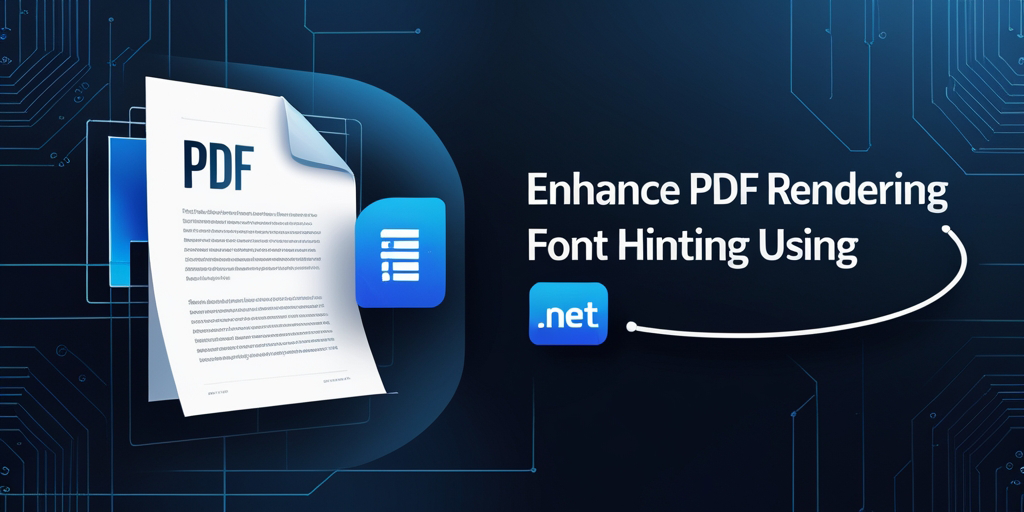How to Enhance PDF Rendering in .NET Using GroupDocs.Viewer: Enable Font Hinting
Introduction
Improve the clarity and readability of text in rendered PDF documents within your .NET applications by enabling font hinting. This tutorial explores how to implement this enhancement using GroupDocs.Viewer for .NET, a powerful library designed for viewing and manipulating document formats.

What You’ll Learn:
- Setting up your environment with GroupDocs.Viewer for .NET
- Enabling font hinting when rendering PDFs as images
- Optimizing performance for PDF rendering tasks
Before diving into the implementation, ensure you have all prerequisites covered.
Prerequisites
To follow this tutorial effectively, you’ll need:
- Libraries & Versions: GroupDocs.Viewer version 25.3.0 or later.
- Environment Setup: A .NET development environment set up on Windows or Linux.
- Knowledge Requirements: Basic understanding of C# and familiarity with working in a .NET project.
Setting Up GroupDocs.Viewer for .NET
Installation
To get started, install the latest version of GroupDocs.Viewer using one of these methods:
NuGet Package Manager Console:
Install-Package GroupDocs.Viewer -Version 25.3.0
.NET CLI:
dotnet add package GroupDocs.Viewer --version 25.3.0
Licensing
GroupDocs offers a free trial and temporary licenses for testing its features without limitations. To purchase a license or acquire a temporary one, visit the purchase page or temporary license page.
Basic Initialization and Setup
Start by initializing the Viewer object with your PDF document path:
using System;
using GroupDocs.Viewer;
using GroupDocs.Viewer.Options;
string documentPath = "YOUR_DOCUMENT_DIRECTORY/Hieroglyphs1.pdf";
using (Viewer viewer = new Viewer(documentPath))
{
// Initialization code here...
}
Implementation Guide
In this section, we’ll break down the steps to enable font hinting when rendering PDF documents.
Enable Font Hinting for Better Text Rendering
Overview: Font hinting improves text clarity by adjusting outline fonts during rendering. This feature is especially useful in GroupDocs.Viewer for .NET when converting PDF pages to images.
Step-by-Step Implementation
Define Output Directory and File Format
Create a directory where your rendered files will be saved, and set up the output file format:
string outputDirectory = Path.Combine("YOUR_OUTPUT_DIRECTORY"); string pageFilePathFormat = Path.Combine(outputDirectory, "page_{0}.png");Initialize Viewer with PDF Document
Load your PDF document into the Viewer object. Replace
'TestFiles.HIEROGLYPHS_1_PDF'with your file path:using (Viewer viewer = new Viewer("YOUR_DOCUMENT_DIRECTORY/Hieroglyphs1.pdf")) { // Continue to rendering setup... }Set Up Rendering Options
Use
PngViewOptionsto specify that the output should be PNG files and enable font hinting:PngViewOptions options = new PngViewOptions(pageFilePathFormat) { PdfOptions = { EnableFontHinting = true } };Render the Document
Render the first page of your document with the specified options to see the effects of font hinting:
viewer.View(options, 1);
Troubleshooting Tips
- Ensure that your output directory is writable and exists before rendering.
- If fonts are not displaying correctly, verify that
EnableFontHintingis set to true.
Practical Applications
Implementing font hinting can greatly benefit various scenarios:
- Document Preview Systems: Enhance the clarity of text in document preview interfaces within web or desktop applications.
- PDF-to-Image Conversion Tools: Improve output quality for tools that convert PDFs into image formats for archiving or sharing.
- Content Management Systems (CMS): Use GroupDocs.Viewer to render and display PDF content seamlessly with improved readability.
Performance Considerations
To ensure optimal performance when using GroupDocs.Viewer:
- Utilize efficient memory management techniques in .NET, such as disposing of objects promptly.
- Monitor resource usage during rendering tasks to avoid bottlenecks.
- Profile your application to identify and address performance issues early.
Conclusion
By following this guide, you’ve learned how to enable font hinting with GroupDocs.Viewer for .NET, enhancing the clarity of rendered PDF documents. This feature is just one aspect of what GroupDocs.Viewer can offer, so consider exploring other functionalities such as watermarking or different output formats next.
Next Steps:
- Experiment with rendering multiple pages.
- Integrate GroupDocs.Viewer into your existing .NET projects to leverage its full capabilities.
Call-to-Action: Try implementing font hinting in your application today and experience the improved text clarity!
FAQ Section
What is font hinting, and why is it important?
- Font hinting adjusts outline fonts for better readability during rendering, crucial for clear text display.
Can I use GroupDocs.Viewer without a license?
- Yes, you can try out the free trial version to explore its features.
How do I render multiple pages with font hinting enabled?
- Use a loop to call
viewer.View(options)for each page number.
- Use a loop to call
What are some alternatives to GroupDocs.Viewer for .NET?
- Other libraries like PdfSharp or iTextSharp offer PDF rendering functionalities, though they may not have all the features of GroupDocs.Viewer.
How can I optimize performance when using GroupDocs.Viewer in my application?
- Optimize resource usage and manage memory effectively by disposing of objects promptly.
Resources
With this comprehensive guide, you’re now equipped to enhance your PDF rendering projects using GroupDocs.Viewer for .NET. Happy coding!